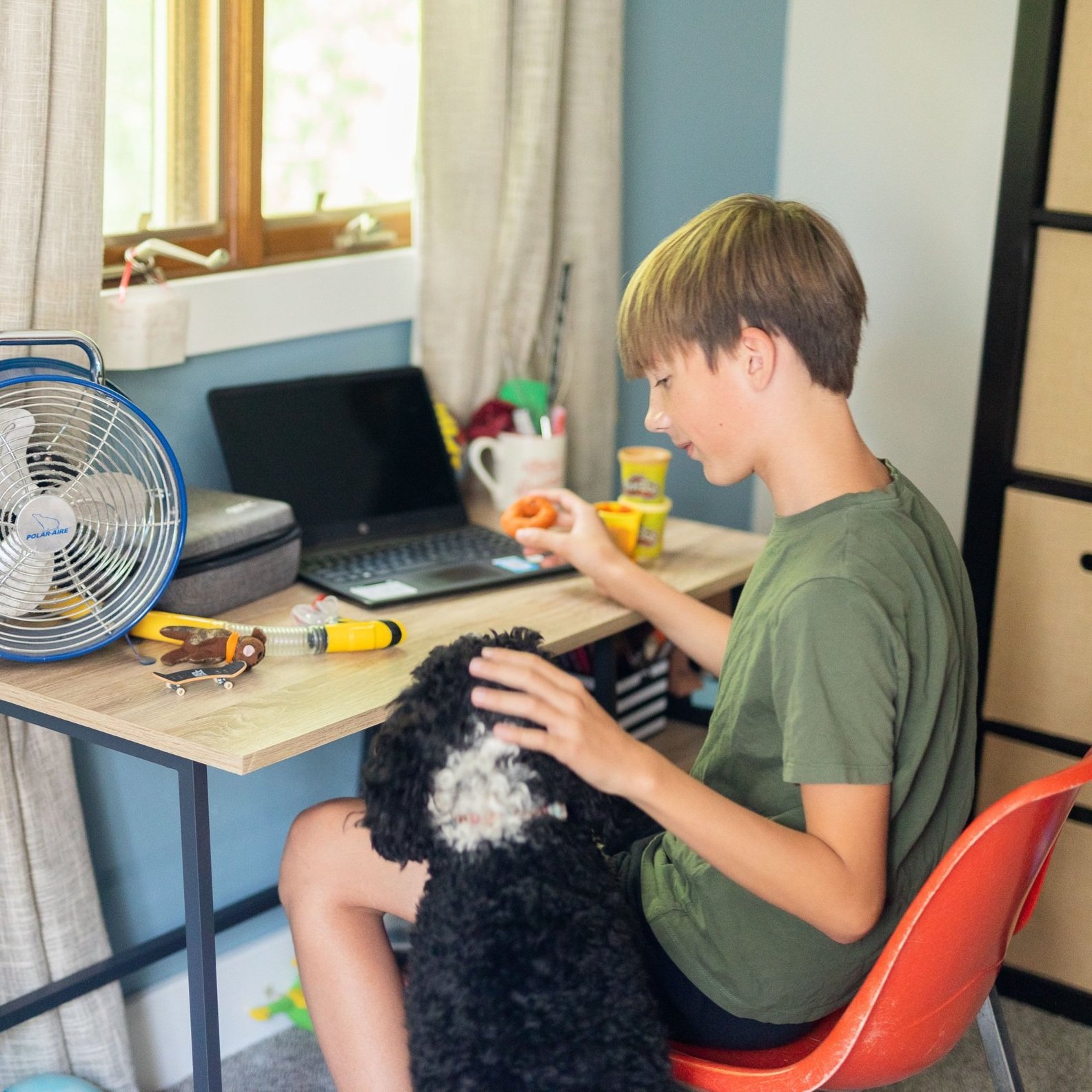From Stress to Serenity: The Science Behind Campus Canine Companions
Introduction
College can be a thrilling time full of fresh experiences, learning, and personal development. However, it can also be quite stressful and anxiety-inducing. At Stokeshire, Our aim is to have a positive impact by providing cute and heartwarming doodles that not only bring a smile to your face but also offer useful resources for managing mental health with the right pairing and training with therapy in mind from our dedicated team.
In the pursuit of improving the atmosphere of higher education amidst the chaos of modern stress, there is a novel and, some would argue, an essential solution for college campuses. The innovative introduction of Psychiatric Service Doodles, a twist on traditional psychiatric service animals, suggests that every college should have a dog on their premises. It's not just a fanciful idea – the inclusion of these four-legged friends is based on scientific evidence that supports their role as stress-relievers, mood-boosters, and social bonding powerhouses.
James is a Concordia St. Paul Alum and stays up-to-date on what is going on within the Unversity Family. Concordia University Wisconsin's Compassion Care Certificate program equips students with essential skills for compassionate caregiving in various vocational settings. Led by Dr. Nicole Muth, the program comprises 12 credits spread over two courses per semester, with practical dog handling as a foundational course. Students earn two certificates, one from the university and another from Dawgs in Motion. They may also apply to be handlers for Concordia's comfort dogs.
Key College Student Mental Health Statistics (Editor’s Choice)
Mavi with Guardian Brother - Shot for Embark Behavior Health
64% of students drop out of college because of mental health problems.
About 75% of mental illnesses appear by the age of 24.
During COVID-19, nine in 10 students have experienced negative mental health symptoms.
48% of students believe that COVID-19 has impacted their education and mental health.
About 65% of students were primarily worried about how long the pandemic would last.
41% of US college students have depression.
33% of students who receive mental health services consider suicide.
Between 2% and 8% of college students are diagnosed with ADHD.
Service Goals
Accessible Support
Our doodles are more than just cute pictures; they are gateways to accessible mental health support. We aim to make students feel understood and not alone in their struggles.
Stress Reduction
Each doodle is designed with care, incorporating elements that aim to induce calmness and reduce anxiety. These furry friends remind you to take a moment to breathe and regain balance.
Community Building
By sharing our doodles, we foster a community where students can connect over common experiences. It's a space filled with empathy and encouragement.
Mental Health Awareness
Education is empowerment. Our content raises awareness about mental health, breaks down stigma, and contributes to an informed student body.
Self-Reflection & Care
Through engaging narratives, our doodles prompt reflection on one's own mental health, emphasizing the importance of self-care and seeking help when needed.
Getting a Puppy for Service
Considering a furry service companion? Our doodles include actionable steps on how to approach the topic and what to consider when looking for a psychiatric service puppy.
Calm in Fluffy Packages: The Role of Canine Companions
Envision a cozy corner in a bustling college library, where a sign reads, "Reserved for Therapy Dog Time." In those moments, midterm mayhem and project pandemonium are replaced by a collective sense of tranquility as students commune with their furry friends. The calm that dogs impart isn't just anecdotal; it's been rigorously studied. Interactions with dogs lower cortisol levels, decrease heart rates, and evoke a cascade of feel-good hormones, including oxytocin and endorphins, which can lead to reduced feelings of anxiety and improved moods.
Studies have also shown that petting a dog for just a few minutes releases these chemicals, encouraging feelings of happiness and relaxation. This effect, often referred to as the 'pet effect,' is a genuine and immediate balm for the stresses of campus life. Beyond this, canine companions act as ongoing support systems, promoting a sense of routine and responsibility, factors that have been shown to stabilize mental health.
Science-Backed Support: The Impact on Campus Mental Health
The mental health crisis on college campuses is well-documented, and it’s clear that traditional services and support structures are not always fully accessible or effective. Here, Psychiatric Service Doodles propose a paradigm shift. Their constant availability means students have a reliable non-human friend when they need one; no appointments are required, no initial barriers need be crossed to gain their solace.
This availability matters because mental health struggles often strike without warning or regard for convenience. For students navigating the tricky waters of academia, the instantaneous presence and unconditional support of a Psychiatric Service Doodle can be a game-changer. Their effectiveness in alleviating the individual burdens of mental health and forming part of holistic mental healthcare strategy cannot be overstated.
A Tail Wagging the College Experience
Introducing Psychiatric Service Doodles to college campuses isn't just about alleviating the burden of mental health disorders. It's about fostering a culture of compassion and community that transcends species. Dogs are spectacular at breaking down social barriers; a brief interaction over a Doodle's furry head can lead to conversations that bridge the gap between strangers.
These encounters encourage greater inclusivity and a supportive community spirit. Psychiatric Service Doodles can anchor and enhance campus-wide well-being efforts, serve as conversation starters about mental health, and even boost attendance at wellness events. By doing so, they become catalysts for a collegiate environment that values and prioritizes the mental health of its members.
Complementing Current Initiatives: A Canine Addition to the Care Team
This proposal isn't about replacing existing mental health services but enriching them. Psychiatric Service Doodles can work side-by-side with college counseling centers and mental health professionals, offering an additional layer of emotional support. They operate as non-judgmental listeners who necessitate no dialogue.
Their role is about providing comfort, promoting a sense of safety, and engendering the emotional connection missing in so many traditional therapy settings. Whether they’re integrated into individual therapy sessions or play a role in on-campus mental health awareness, they present a valuable and evidence-based supplement to the existing mental health care system.
Fostering a Furry Future: Implementing Psychiatric Service Doodles
The road to welcoming Psychiatric Service Doodles onto college campuses involves several important considerations. From identifying suitable breeds and individuals, to providing the necessary training, developing campus guidelines, and securing funds for their care and support, it's a comprehensive process that requires dedication and thoughtfulness.
To ensure the success of such an initiative, a detailed framework must be put in place. This framework includes breed and temperament assessment, puppy socialization programs, handler training, workplace protocols, and the well-being of the animals themselves. It's a meticulous but rewarding venture that has the potential to redefine the college experience for generations.
Parting the Clouds with Pawsitive Change
The introduction of Psychiatric Service Doodles to college campuses is a vibrant step towards nurturing the mental health of our students and transforming our institutions into truly supportive environments. The heartening evidence of their efficacy, combined with the cultural shift they inspire, makes this innovative approach a beacon of hope amidst the fog of academic pressure.
The wagging tails and soulful gazes of Psychiatric Service Doodles promise more than just moments of respite; they signify the beginning of a brighter future for students and campuses alike. It is an investment in compassion, an anthem to inclusivity, and a bold proclamation that mental well-being is not just a clinical goal but a fundamental human right.
For colleges across the nation, the call to action is clear. It's time to take a bold stride forward, into a future where every campus has a furry guardian, a steadfast ally in the complex narrative of college life. A Psychiatric Service Doodle may be small in stature, but their potential to impact the mental health landscape of higher learning is immeasurable.
The science is barking — and it's time for campuses to listen.
Target Audience
Psychiatric service doodles reach out to a broad spectrum of college students who are seeking ways to manage stress, who are advocates for mental health, or who are simply in need of a light-hearted break from their studies. Whether you're facing finals week, juggling work and school, or dealing with the everyday highs and lows of college life, we hear you pain and think you should advocate for one on your college campus, just like Concordia.
Conclusion
The world of Psychiatric Service Doodles is one brimming with compassion, laughter, and invaluable resources. In a world that can often feel overwhelming, remember that help can come in the smallest and fluffiest of packages. Keep an eye on our content, share with friends, and don't forget to prioritize yourself amidst the hustle and bustle of student life. Together, we can make college a less stressful and more supportive experience.



